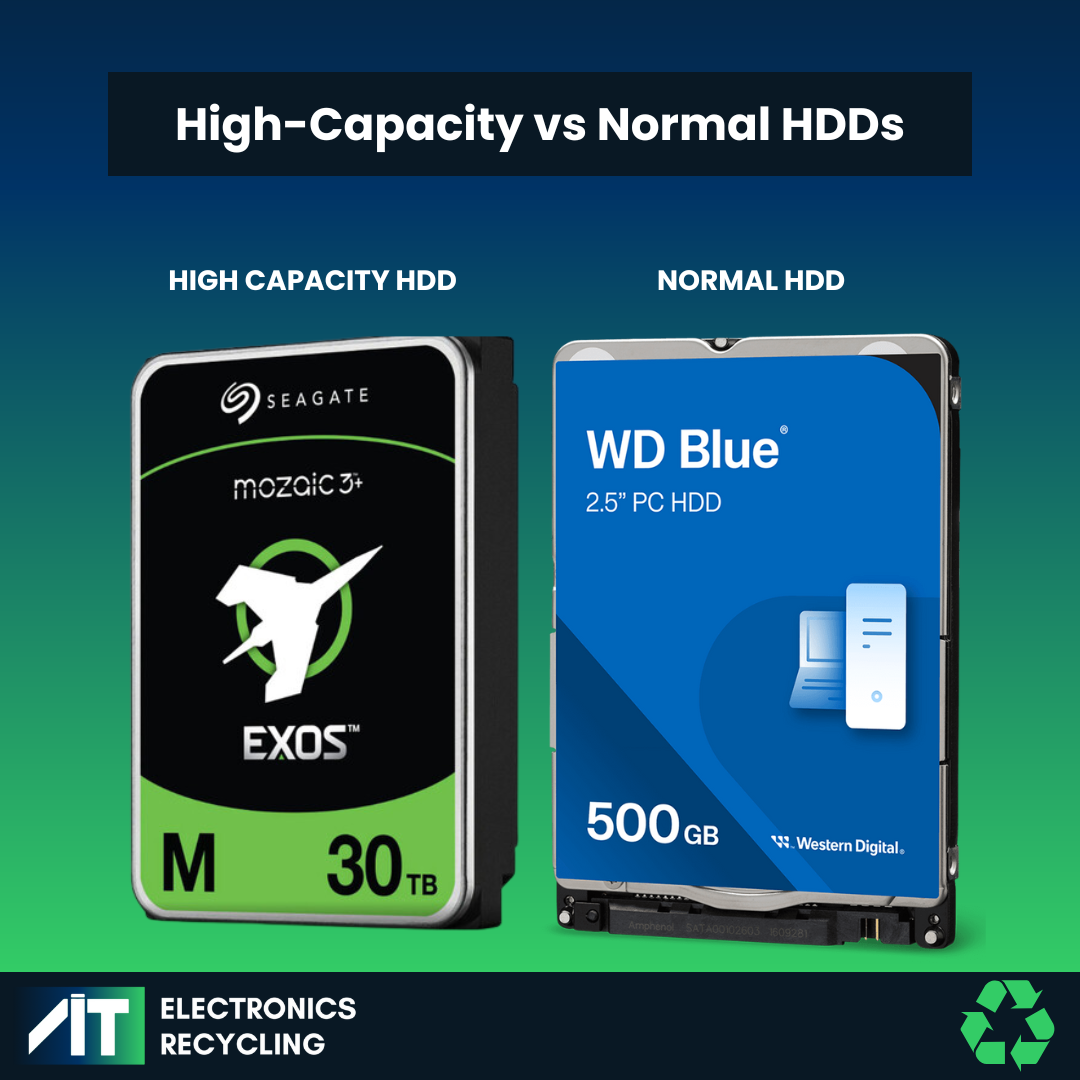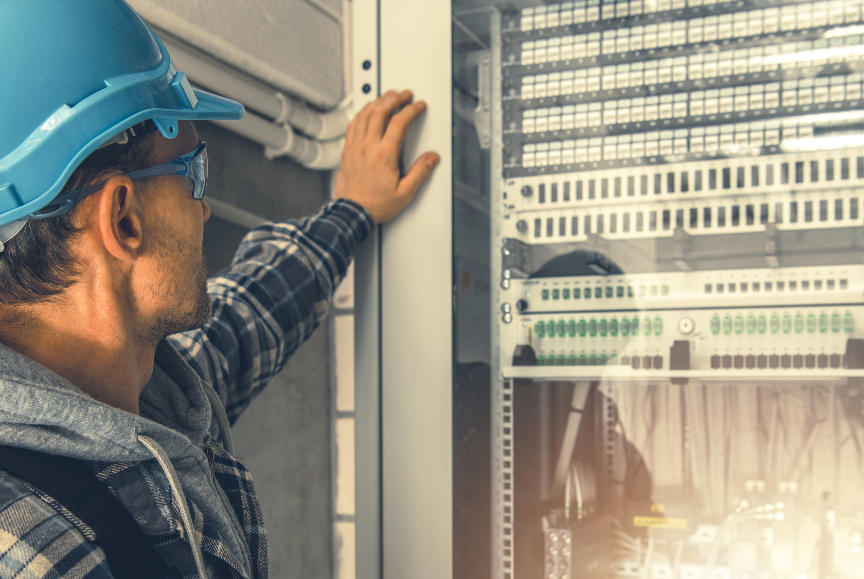When it comes to data storage, not all hard drives are created equal. While consumer-grade hard disk drives (HDDs) might suffice for personal use, businesses handling large amounts of data often rely on enterprise-class HDDs for their unique needs. But what sets these two types of drives apart?
This blog breaks down the key differences between enterprise-class and normal HDDs, including durability, performance, capacity, and use cases. We’ll also explore why secure recycling of enterprise-class HDDs is crucial and explain how AIT’s certified data destruction and eco-friendly e-waste disposal services can help your business stay compliant, secure, and sustainable.

Understanding Enterprise HDDs vs. Normal HDDs
To fully understand the differences, it’s essential to look at how each drive is designed and the purpose it serves. For more insights on asset management and secure drive disposal, check out AIT’s IT Asset Disposition (ITAD) services.
| Category | Enterprise HDDs | Normal HDDs |
| Durability | Designed for 24/7 operation in demanding environments. | Built for intermittent use (a few hours daily). |
| Resistant to heat, vibration, and wear. | Less resistant to environmental factors. | |
| MTBF: 2 million+ hours. | MTBF: Less than 1 million hours. | |
| Performance | Faster spindle speeds (10,000–15,000 RPM). | Slower spindle speeds (5,400–7,200 RPM). |
| Advanced error correction and data integrity features. | Limited error recovery capabilities. | |
| Optimized for sustained, multi-threaded workloads. | Struggles with heavy, sustained workloads. | |
| Capacity | High-capacity drives ranging from 8TB to 20TB+. | Capacity typically ranges from 500GB to 5TB. |
| Ideal for large-scale data storage needs. | Suitable for personal or small-scale use. | |
| Use Cases | Data centers, cloud platforms, and AI workloads. | Personal laptops, desktops, and external storage. |
| Industries requiring compliance (e.g., healthcare, finance). | Low-demand office tasks (e.g., document storage). | |
| High-performance applications like big data analytics. | Home backups and casual use. |
1. Durability and Reliability
Enterprise HDDs are built for toughness, designed to operate in demanding environments like data centers and server farms. These drives:
- Run 24/7 without compromising performance.
- Are more resistant to environmental factors like heat and vibration.
- Typically have a mean time between failures (MTBF) of 2 million hours or more, compared to less than 1 million hours for consumer drives.
Learn more about how we support enterprise data centers with reliable hardware lifecycle solutions.
Normal HDDs, in contrast:
- Are designed for intermittent use, such as a few hours a day in personal computers or external storage devices.
- Are less heat-resistant and not built for constant operation, making them prone to wear over time in high-demand environments.
2. Performance
Enterprise HDDs consistently outperform their consumer-grade counterparts. Here’s why:
- Higher Speed: Enterprise HDDs often have faster spindle speeds (10,000–15,000 RPM compared to 5,400–7,200 RPM for standard drives), enabling quicker data access.
- Error Recovery: These drives feature advanced error correction and data integrity technologies, ensuring minimal data loss or corruption even under heavy loads.
- Sustained Workloads: They are optimized to handle intensive, multi-threaded workloads, such as massive data transfers and virtualized environments.
Normal HDDs, on the other hand:
- Struggle with heavy, sustained workloads.
- Lack advanced recovery options, making them unsuitable for mission-critical environments where data accuracy is paramount.
3. Capacity
Capacity is another key differentiator:
- Enterprise HDDs often offer high-capacity drives ranging from 8TB to over 20TB to meet the storage requirements of large organizations. Explore AIT’s enterprise-class HDD recycling for sustainable solutions for these high-capacity devices.
- Normal HDDs are typically capped at lower capacities, ranging between 500GB and 5TB, which is sufficient for general consumer use but limiting for businesses.
4. Use Cases
- Enterprise HDDs are used in:
- Data centers.
- Cloud computing platforms.
- Hospitals and financial institutions requiring HIPAA- or GDPR-compliant storage.
- High-performance workloads like artificial intelligence (AI) and big data analytics.
Find out how we assist these industries on our case studies page.
- Normal HDDs are common in:
- Personal laptops and desktops.
- External storage or backup drives for home use.
- Low-demand office tasks, like storing employee documents.
5. Cost
The durability, performance, and capacity of enterprise HDDs make them significantly more expensive than normal HDDs. However, for businesses, the higher reliability and reduced downtime usually justify the cost. To see how you can maximize ROI during technology refreshes, visit our remarketing and value recovery services.
The Importance of Destroying High Capacity HDDs for Businesses
Enterprise-class HDDs hold critical, sensitive data, necessitating secure disposal when they reach the end of their lifecycle. Improper disposal poses risks, including:
- Data Breaches: Residual data on drives can be exploited if not securely destroyed. Financial records, client information, and intellectual property may be at risk.
- Environmental Hazards: Enterprise HDDs contain materials like lead, mercury, and cadmium, which can leak into the environment if devices are improperly discarded.
How AIT Can Help
At AIT, we specialize in enterprise-class HDD destruction, offering:
- Certified Data Destruction: Data thoroughly destroyed using secure methods that exceed NIST and IEEE standards.
- Eco-Friendly Practices: We ensure any old equipment housing the HDD is recycled responsibly for raw material re-use in the IT asset lifecycle.
- White-Glove ITAD Services: Enjoy full-service asset handling, including de-installation of equipment, wrapping and packing, pickup, data destruction, recycling of equipment and detailed certificates of destruction.

Ready to turn your old IT assets into peace of mind? Get started with AIT’s secure and sustainable HDD recycling. Contact AIT now to schedule Certified Data Destruction for your enterprise HDDs!
FAQ
To provide even more value, here are answers to some of the most common questions about enterprise-class HDDs:
Enterprise HDDs are engineered for continuous, high-performance use in environments like data centers. They feature higher reliability, faster speeds, and advanced error correction compared to consumer HDDs.
Technically, yes, but it’s not recommended. Enterprise HDDs often generate more heat, consume more power, and aren’t optimized for intermittent use. A standard HDD is a better option for personal devices.
At AIT, we use certified data destruction methods that meet and exceed NIST and IEEE standards, such as:
- Wiping: Overwriting data securely with multiple passes of random information.
- Degaussing: Magnetic fields render data unreadable.
- Shredding: Drives are physically destroyed into tiny pieces.
You can dive deeper into our certified procedures and the compliance standards we exceed on our site.
Certified data destruction is vital to:
- Protect sensitive business data.
- Avoid legal penalties with improper handling of client data.
- Avoid fines arising from improper data storage or data theft incidents.
Our R2-compliant recycling process ensures both data protection and environmental responsibility across all high-capacity drives.
Most enterprise HDDs are rated for up to 5 years of continuous use. Regular monitoring and maintenance ensure optimal performance and can extend lifespan. If you’re planning to upgrade, check out our IT asset disposition (ITAD) services for secure transition options.
Several factors influence longevity. Mechanical issues—like motor or bearing wear—can develop over time, especially if the drive sits unused for extended periods. Environmental conditions such as excess heat, moisture, dust, or exposure to strong magnetic fields may also impact reliability. To help ensure your HDD lasts, store it in a cool, dry environment, and consider powering it on occasionally to keep internal components in working order. For long-term data safety, regular backups and periodic integrity checks are highly recommended.
High-capacity hard drives are not necessarily larger in physical size than standard hard drives. Both enterprise and consumer HDDs typically come in industry-standard form factors, most commonly 3.5-inch for desktops and servers and 2.5-inch for laptops and portable devices. The main distinction lies in storage capacity: high-capacity HDDs use advancements in technology to store far more data – often exceeding 10TB – within the same physical dimensions as lower-capacity drives. So while their storage abilities are significantly greater, their external size usually remains the same, making them compatible with most existing hardware setups.
AIT offers personalized solutions including on-site data destruction, eco-friendly recycling, and secure transport options. We also issue certificates of destruction for compliance and peace of mind. For a closer look at our real-world results, check out our Synchronoss case study.
Enterprise-class HDDs and normal HDDs cater to completely different audiences, with the former designed for high-demand business environments and the latter for casual personal use. Understanding their differences can help businesses make better storage decisions and ensure secure disposal when these drives reach the end of their lifecycle.
At AIT, we take the guesswork out of enterprise-class HDD recycling. Whether you need assistance wiping sensitive data or handling bulky high-capacity drives, our certified experts and eco-friendly methods can meet your needs.
Looking for certified data destruction for your high capacity HDDs?Contact AIT today for secure and sustainable data destruction solutions for you and your team!